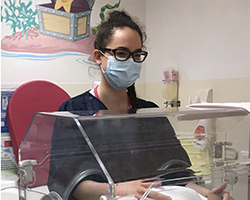Fanny Lopez, paediatric nurse supporting premature newborns and their parents

Fanny Lopez
“I am always amazed to see the potential and will in newborns to grow and develop. As caregivers, we are there help them develop to their full potential. Our care and support are particularly important when they are born premature,” says Fanny Lopez, a paediatric nurse working in the intensive care unit of the neonatal unit in Centre Hospitalier Rives de Seine, Neuilly-sur-Seine, France.
“I have wanted to care for children since I was 10. I remember the day I first saw my newborn cousin. I was simply enthralled by the baby and remain fascinated with children of every age to this day.”
Supporting a child’s natural development
“I have been working as a paediatric nurse for 4 years. In addition to my nursing degree, I completed a 1-year programme at a specialized paediatric nursing school. In France, paediatric nurses specialize in early childhood and adolescence.
“At the intensive care unit, I take care of moderate preterm babies. We nurses provide care for preterm newborns presenting gastrointestinal and digestive, and respiratory problems. We also support the child’s natural development.
“The most challenging experience I have had at work, concerned a newborn baby girl with acute respiratory problems, requiring immediate intubation. What amazed me was the calm in which the situation was handled. Each of my colleagues knew their role and task, and despite it being emotionally hard, we took care of the baby. We were relieved to hear afterwards that she had recovered and was well. I find it truly difficult to see a child’s health degrade or become unstable.
“In addition to providing medical, nutritional and hygienic care in hospitals or maternity units, we play an educational role in our collaboration with families and parents. We make use of our team management, communication and educational skills.”
Helping mothers and fathers become parents
“Parents can come and visit their child at the intensive care unit day or night. With our help, parents learn how to interact with their baby – how to feed and bathe them, change their clothes and diapers, take their temperature. It’s important that the baby has a full and profound connection with the parents, so skin-to-skin contact is highly recommended and encouraged from the start.
“Parents need to gain confidence. Premature birth is often linked to trauma, guilt and psychological issues. We are there to support them.
“When the child leaves the neonatal unit and if a follow-up at home is needed, a paediatric nurse and paediatrician continue to offer psychomotor and language development assistance up to the age of 7.”
Working in teams to analyse and draw lessons from experiences
“Teamwork is extremely important in everything we do in the intensive care unit. We always work in pairs and discuss our tasks extensively among ourselves, which gives us a broader view of what we do.
“Each morning a paediatrician joins the nurses’ team to talk about the babies and their condition. The specialist consults us about our concerns and we discuss the baby’s development. We also have weekly meetings with paediatricians, psychologists and physiotherapists, which gives a holistic overview of each baby, their progress and parents. We aim to individualize the care as much as possible.
“We also take the time to reflect on and assess the way we take care of children and their parents. In groups, we go through past incidents and try to identify what we can learn from them and how we can improve.
“As paediatric nurses, we work closely with newborns and children, and have much to share with other health professionals in terms of our experiences and observations. I wish we could dedicate more time to reviewing scientific literature, to support our contributions.”



